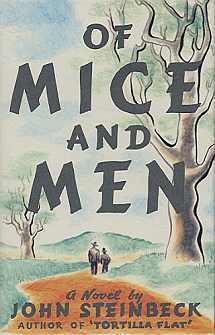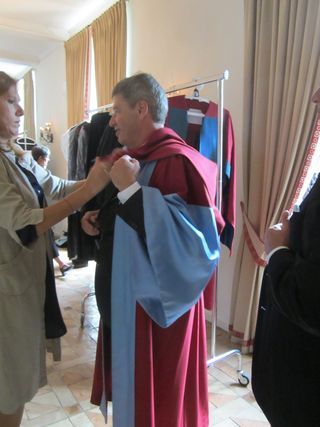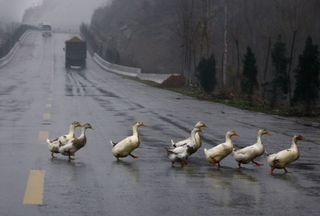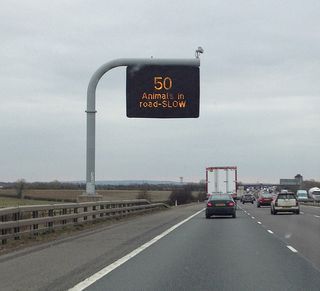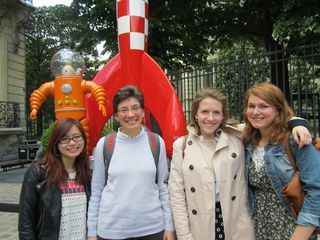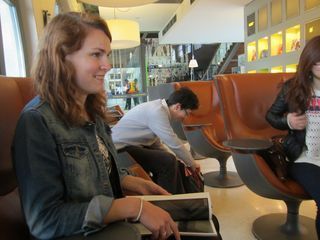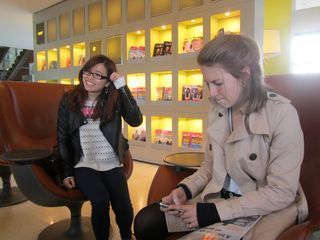Mary Beard's Blog, page 34
May 30, 2014
The power of the valedictory lecture
There is is an the university world a new genre: the valedictory lecture given when you retire from your chair, to balance the inaugural lecture when you take it up. The first one I heard was that of Myles Burnyeat (when he retired from the Chair of Ancient Philosophy in Cambridge) -- that was years back, and he had never given an inaugural, so it was a kind of subsitute.
Recently I heard an elegant valedictory from my colleague Paul Cartledge (from the Leventis Chair of Ancient Greek Culture), and tonight I went to the valedictory of David Sedley (he, like Myles, was the Chair of Ancient Philosophy, and hadn't given an inaugural either). It was a wonderful account of the nature and appearance of god, as seen and debated in ancient Greek philosophy (sphericity is key, I will give away). But he ended with a wry, quizzical, and sharp reflection on what Aristotle would have thought about modern university REF culture (he probably would have quite liked collaborative research projects, but have been appalled by Impact -- knowledge and understanding being crucial for society in its own right and in its own terms).
At the party afterwards, Christopher Kelly gave a brilliant au revoir to David, quoting Choricius of Gaza who argued that the more modest the man you were praising, the more insistent you should be. David is very modest and Christopher praised brilliantly (and very funnily -- who was the most spherical her wondered). But I also fell in with M M McCabe, who had recently given her own valedictory at Kings College London. I had missed it. But, in the spirit of David's reflections at the end of his lecture, she tackled head on and brilliantly dissected the nature of the modern university.I have now listened to it on the web.
Anyone interested in the value of intellectual enquiry should listen to this lecture more than once. You can find it here. But do skip the first ten minutes of introduction (which I fear is an inadvertent, albeit well meaning, example of what M M is arguing against).
I declare an interest here. M M taught me philosophy in my first year in Cambridge -- or she tried to (I quite liked the Pre-Socratics with M M but to be honest I didnt progress, and we came to what we might call "an agreement"). She went on to great things in ancient philosophy and is, as I said, just retiring from her Philosophy chair in King's.
This lecture links the very foundations of the western intellectual tradition with the aims of the modern university, and she exposes from the front line the (anti-intellectual, tick-box) nature of some university administrations and planning. Of course, there is another side -- and, sure, there is an argument to be had. But noone has ever to my knowledge put the argument for the importance of university intellectual inquiry (and teaching) more eloquently -- or with greater knowledge (both of philosophy, ancient traditions and the structures of the modern university). She dumps better on the culture of ratings, branding, REF, funding regimes and competition than anyone I have listened to. And she enlists Socrates on her side ("Learning cannot be put up for sale .. and Socrates can maybe show us why").
Enjoy! (And could someone send it to Mr Willetts?)
May 26, 2014
So what's ENGLISH literature?
One always has to be a bit careful about getting up in arms too quickly about reforms in school education. We really dont know for a fact yet that Mice and Men has been "banned" because Mr Gove doesn't like it (though I am tempted to say that the fact that such a rumour is even plausible says something about how we have come to take political "interference" in the syllabus for granted); but we can be pretty certain that there will be thousands of schools across the land flogging off their Steinbecks by the dozen for next to nothing.
It's also the case that the insistence in the Department of Education document on certain categories of literature (at least one play by Shakespeare, at least one 19th century novel) are minumum requirements, and nothing is to stop more being taught. Yet the exam for English Literature GCSE really doesn't have that many "set books", and anyway the importance of getting the kids to get the top grades in order to make sure the school has a good place in the League tables is not an incentive to wide and imaginative exploration.
With a bit of perseverance you will get through to the nitty gritty via this website . But I reckoned from looking at one specification that we are currently dealing with: one Shakepeare play (plus a performed version), selections of the work of one "old" poet (from Chaucer to Wilfred Owen), one modern play, one prose work "from a different culture" (that's where Mice and Men comes in), one "oldish" novel (eg Pride and Prejudice or Animal Farm), and selections from work of one modern poet (eg Seamus Heaney, Carol-Ann Duffy). So, once the DoE rules are taken into account, there wont be very much room for anything else.
What I soon became curious about, however, was what the rules actually meant, and what counted as fulfilling the rules. My first query concerned Ireland. I know James Joyce isn't likely to get set for GCSE, but would Ulysses only count as sufficiently "English" if it actually appeared before Irish independence (as it happens, it did: published in February 1922, when independent Eire was formally established, signed and sealed in December . . . Phew). But I neednt have worried, the prescription carefully says post 1914 fiction or drama from the "British Isles". So Southern Ireland is in, whatever.
But there did turn out to be a broader question, which produced tricky questions of definition. Would something written by Auden in the USA count, or Robert Graves on Majorca?
According to the DoE as quoted in the Guardian, the rule is the exam should include a work of fiction or drama "written in" the British Isles. In which case, we had better make sure where Graves was resident (Majorca, Cairo?) before we start setting I, Claudius or Goodbye to All That. And (were it not for being just the wrong side of the 1914 watershed) then a lot of Henry James (who wrote much of his stuff in London) would squeak in.
In fact, when I looked at the actual DoE document, it didn't quite say that (you can reach it through here). It said: "fiction or drama from the British Isles from 1914 onwards". That's obviously different, but it's not quite sure exactly how different. Does that mean published in the British Isles? Or written by someone whose work is generally identified as from the British Isles (never mind whether they wrote the stuff on a long Australian holiday)? In which case Graves would be fine, but there would still be a big question over Auden (who became a US citizen, for heavens sake). And anyway how should we interpret the fact that it is the work not the author that is to come "from" the British Isles? In what sense do "works" have homes?
And the nineteenth-century novel has some awkward edges too. I guess we wouldn't want to set kids to read the juvenilia of Jane Austen, but what about Tristram Shandy?
Now, you might say that all this is silly nit-picking. It is pretty clear what the DoE prescriptions are getting at and anyway, most of the things I have been mentioning wouldn't be obvious candidates for GCSE (though they might well be for A level). But the point is that is does expose the ridiculous side to this kind of centralised syllabus management (especially when, frankly, it isn't very well drafted... didn't anyone in the DoE themselves wonder what "from the British Isles" actually meant? what kind of use of English is that?). And it also exposes the fact that in the English speaking global literary world post 1914, then these boundaries cant usefully be policed anyway. Perhaps we should flood the DoE asking for adjudication on some of the hard cases.
Or perhaps better, the Department and Mr Gove might like to go and have a look at the ThisBook website. It's a project (connected with the Baileys Prize) that is asking women to choose the book written by a woman that has has the most impact on them. There's a first tranch of choices on the website now, from the likes of Sandi Toksvig, Martha Lane-Fox, Caitlin Moran and (yes) me. What is so striking is that these books come from everywhere. There are some nineteenth-century favourites (I chose Jane Eyre, Martha Lane Fox chose Mary Barton, and Kate Mosse had Wuthering Heights) -- but there are "foreign" books too by Toni Morrison, Maya Angelou and Harper Lee (two people, Shami Chakrabarti and Sharleen Spiteri picked To Kill a Mocking Bird).
Isn't the lesson here that we should just lighten up a bit and reckon that different things work for different kids, and different people, and that we should encourage that?
May 23, 2014
At the American University in Rome
I am blogging this from Rome airport (that's how much I care for you!) -- on my way back to a Cambridge Women's Classics do this very evening, which I very much hope I will make (plane currently 45 minutes late, so maybe this was a very stupid plan). I have been in Rome for no scholarly purpose but to collect an Honorary Degree at the American University (currently presided over by UK archaeologist Richard Hodges) at their Commencement ceremony.
Before anyone talks about sensible use of time, let me say that I did manage to include in this trip one whole day of unbothered, uninterrupted work (such as rarely happens in Cambridge) -- not to mention a 90 minute kip in the afternoon (which, to be honest, I felt I deserved).
And the ceremony and setting for the whole thing were just out of this world -- I don't honestly think I know a better view anywhere than the view of Rome from the Gianicolo (though I am sure commenters will suggest!). And that is where the AUR is.
The party last night was in the grounds of the Villa Aurelia a Rome location rivalled only in gorgeousness, in my experience, by Villa Lante, not far away (the trees as we left, near midnight, looked as you see in the picture at the top of this post).
And that's where the ceremony itself was this morning.
As always on these occasions, the students getting their degrees are just splendid (thank you all -- brilliant! And thank you President Hodges, being togged up in West Ham colours above). And the fellow honorands are fascinating. Today in fact the honorary degrees -- ie those you dont have to work for -- went to just two of us: me and the infinitely more famous Aurelio de Laurentiis (below right at dinner) -- a major Italian film  producer and more, and the owner of Napoli football club. Hence the attendance of an Italian government minister or two, and a host of the Italian press (not interested in me I can promise).
producer and more, and the owner of Napoli football club. Hence the attendance of an Italian government minister or two, and a host of the Italian press (not interested in me I can promise).
I have to say that from Aurelio's speech, I got the impression that the Italian film and football industries were pretty blokeish. So I didnt stint on the soft feminism in my own (more that half the graduands were women).
But even more than Aurelio the real star of the show was the ghost of James Walston, a brilliant commenter on Italian politics and a long time charismatic teacher at AUR who died less than two weeks ago. I'd never met Walston, but kind of felt I had. For he was the grandson of Charles Waldstein/Walston of Cambridge and elsewhere, who really got the study of Classical art and archaeology off the ground in my university in the late nineteenth century (and there is Graham Greene connection in between). I have done a bit of work on Waldstein, and one of my graduate students is delving even more deeply.
So there was a strange sense of "home". Thank you all.
May 21, 2014
50 Animals in Road
On Sunday we had a treat, and were taken to Glyndebourne in the afternoon by two of our friends -- to see Eugene Onegin. It's a long drive back to Cambridge and we were amusing ourselves with doing some first principles lit crit on the opera (neither the husband or I, nor I suspect the host who was driving, had actually read more than a page or two about it, nor had we read the Pushkin version from which it is adapted -- hence "first principles").
We were talking about how far we thought it was a terrible romantic tragedy, a comedy or manners or a nasty (though witty) satire on human folly (isn't it a joke that Lensky is such a look-alike Byron? and, in the first act, don't we all know that Tatyana is a larger than life parody of a teenager who just hasn't understood the tactics of playing hard to get . . . and so on).
It was, I fear, that kind of convesation that might not have looked too out of place in Pseuds Cormer -- until it was interrupted on the M11 by a series of notices (over what must have been the last 20 miles or so of the journey) which read "50 Animals in Road SLOW".
A little more donnish chat followed, I confess.
What actually did this mean, we wondered? The husband was outnumbered in the claim that we should be on the look out for 50 animals (... no, we said, it obviously meant "50 (miles per hour speed limit) Animals in Road".)
But it was, all the same, even with the "50" sorted out, a strangely unhelpful notice -- while disconcertingly distracting. I mean it's a very different thing to drive along a motorway on the lookout for cows -- than on the look out for a flock of geese or a family of runaway dogs.
This lead to further discussion about how these motorway notices actually worked. Was there someone sitting in a control room somewhere who could type out any notice he or she fancied in the right number of characters like a Tweet (eg "Geese in road: beware" "Cows behind you, watch out"). Or -- as we came to conclude -- do they just have a small number of pre-written ones from which to choose, so it's "Animals" or nothing?
(There's also that one which says "Take a Break" -- which I doubt has ever persuaded any exhausted motorist to draw into the next service station for a quick nap... "yes, I am rather tired I now realise, I think I will!")
The truth is that, while we kept specially observant, we saw absolutely no sign of wild life at all. SO either that someone was being hyper-cautious, or they had just not got round to turning the signs off.
We rather suspected the latter.
May 16, 2014
Euro elections: to spoil or not to spoil?
I have had a habit of spoiling my ballot paper in Euro-elections. I cannot abide having to vote for a party, all or nothing, rather than an individual. This year, though, I had a wobble. First, writing "I dont like this form of election" across your ballot paper isn't a particularly powerful way of showing yourself a Europhile (which I am). Second, if there is a big UKIP surge, then shouldn't one be putting one's vote solidly behind another party, if one wants to stop it?
So I was all ready to cast a vote this time, until -- as always -- I discovered that I wanted to vote for individuals in different party groups (Labour, Green and Lib Dem), but couldn't. So I went back to plan A and decided to write my usual message.
This wasn't before I had looked rather carefully at the ballot paper and assorted documents that had arrived through the post.
For a start, there was nothing that I could see in the ballot paper bundle to tell me how many seats there were in the Eastern England Region. I concluded, as there were seven candidates named for each party, there must be seven seats. But it would be nice to be told.
Then I had a quick look for the women candidates. There were just 17 out of a total of 70. That was bad enough. But there were only 4 in the top 2 of their respective party lists (and only 1 in the top place with a very strong chance of election). 8 were among the bottom 2 places and so effectively no hopers. UKIP and the BNP had no women at all.
At least 5 of the 10 parties were explicitly anti Europe (including one from the far left). Scratch the surface and there were some weird stories lurking here. I decided to take a bit of time investigating the English Democrats (slogan: I'm English, NOT British, NOT EUropean), who seemed from their party political online broadcast to be extremely worried about immigration and the introduction of Sharia law into England's green and pleasant land.
They did at least have a female candidate at number 4 on their list, one Maria Situmbeko. It didnt take much googlimg to discover that she was married to the man at number 3, Stephen Goldspink. But as Mr Goldspink explained online in 2008: "Because Maria does not have a valid visa to stay in this country (appeal pending), we had to seek Home Office permission to marry."
Hang on, I thought, aren't you against immigration? Particularly when people don't have a valid visa to stay?
Then I had a look a bit more carefully at the UKIP crowd. Now, as I recall, UKIP are supposed to be dead against the professional political class, those who slip from university into political jobs without being in the "real world". But so far as I can see that's exactly what their third ranking candidate has done: Tim Aker, who read History and Politics at Nottingham, is now head of the UKIP policy unit, having been director of "Get Britain Out" and a coordinator of the Tax Payers Alliance. Where's the "real life" in that?
Oh blimey, maybe there's just time to decide not to spoil the ballot paper?
(For a more expert analysis than mine, take a look here.)
May 14, 2014
Your coffee machine is watching you
Just over three years ago we treated ourselves -- that's me and the husband -- to an expensive coffee maker for Christmas, as a mutual present to ourselves. It was a De longhi Prima Donna and in truth it was more than we could afford (hence the mutual Christmas present "buy out"). But we both like cappuccino for breakfast and all cheaper alternatives had proved disappointing. (When it comes to steam pressure, you get what you pay for, it seems.)
Anyway, the Prima Donna had given us over three years of trouble free coffee, until a few weeks ago when a "generic alarm" notice appeared on the little electronic screen (the screen that gives the owner all kinds of warnings: "fill water tank", "descale" or "empty grounds container"). We fixed that, but it still didn't work for cappuccino, though would offer straight coffee.
So we sent the machine off (all seamlessly organised by Delonghi), we accepted the very reasonabale estimate for putting it right, and took return delivery of the (entirely working) machine. No complaints at all.
The funny thing was that the machine was returned with a record of use. Somehow, from the inner chip, the excellent engineer was able to tell us that in the last three years we had made 9266 cups of coffee, using 1796 litres of water, and that we had descaled the appliance 28 times (one of the preliminary repair questions had been "do you descale regularly?"; we had said "yes", but now we see that they could have called us out on that.. "sorry our records say that you have only descaled twice in te last x months ..").
So our favourite machine was keeping track of us, as I now assume that our other appliances must: "you have only turned on your washing machine 28 times in those last 18 months"....and so on ?
The irony was that on that very evening on which I investigated the coffee machine I had talked to an excellent group of students at Newnham. What was the difference, I was asked, between Cambridge life in the 1970s and now?
Confidently, I said that it was the culture of surveillance, the cctv cameras watching on people's comings and goings. Oh yes? It was only when I got home and discovered that my excellent coffee machine had been watching my coffee making activities that I wondered what I had been saying.
It's not Big Brother, it's your coffee machine that's watching you.
May 9, 2014
What's not to like about Caitlin Moran's tweets, Mr Gove?
I am puzzled by the reaction to the OCR exam board's plans to have an "English Language and Literature" A level that involves studying some bits of Russell Brand and Caitlin Moran's tweets. The reaction of the Department of Education (if we can believe the reports, and so far as I know they have not been denied) has been close to threatening: "Schools should be aware that if they offer this rubbish in place of a proper A-level, then pupils may not get into good universities", according to the Guardian.
"This rubbish"?
Well if this were a purely English literature exam, we might well think that. But this is partly a language (and an analysis of language) exam. There is plenty of "high" language and literature in this proposed syllabus (like Pepys, William Blake and Emily Dickinson), but part of the point, I believe, is to get the students to explore changing language use in different genres. Hence that's why they are supposed to think about how different media have an impact on the language we read. Why -- and how -- does a tweet, or a blog, present itself differently from an academic essay? The idea that OCR is somehow wilfully suggesting that the Moran tweets are the equivalent of Songs of Innocence and Exoerience is so way off.
One point about studying language is that you study its many different registers. I mean, when our Classics students in Cambridge think about Latin from a linguistic point of view, they don't just study Virgil or Cicero, they look at graffiti, "popular" Latin, comedy (and all those other genres of which I suspect the spokeperson from the Department of Education would disapprove).
Besides, encouraging A level students to think analytically about some of the cultural genres -- and cultural spokespersons -- they take for granted, must surely be a good thing. Russell Brand isnt using language innocently (in any sense of the word "innocent").
I, of course, have a bit of a vested interest in this. A few years ago, as I reported at the time, there was a small collection of written extracts (plus discussion) published by CUP precisely to encourage students to look carefully at how English is used differently in different media. One of the examples it took was a blog posting from "A Don's LIfe",and it showed, very expertly, how I had (unconsciously in part, I must say) merged the demotic and the academic to create a blog "voice".
It was spot on, and careful in getting the students to NOTICE how language was working. "What's not to like?", Mr Gove?
May 6, 2014
Newnham at the LITTLE palace
As regular readers of the blog will remember, thanks to some very generous donations, we take our Newnham final year students for an educational day trip to Paris before their exams (a day trip also has the very useful effect of wearing them out, and inducing a solidly good night's sleep). The usual plan is to go to the Louvre. But this year we just had to go to the Augustus exhibition at the Grand Palais. There they are, plus my colleague Paola, above.
This was my third visit, having seen it once in Rome and once in Paris. But, yes, you do always see new  things. On this occasion that "new-ness" was helped by meeting by chance at the show my old friend Valérie Huet, so the students got the most expert explanation of the "Louvre Suovetaurilia" (sacrifice of a pig, ram and bull; above) that it was possible to have in the world (it was a big topic in Valérie's doctoral thesis).
things. On this occasion that "new-ness" was helped by meeting by chance at the show my old friend Valérie Huet, so the students got the most expert explanation of the "Louvre Suovetaurilia" (sacrifice of a pig, ram and bull; above) that it was possible to have in the world (it was a big topic in Valérie's doctoral thesis).
The question was what should we do after the Augustus exhibition and a lunch (had to be some further bit of improving culture!).
That end of the Champs Elysées is not the end of Paris I know best, if at all. So after a bit of discussion, Paola ( a better Parisienne than me) and I decided to go for the Petit Palais just across the road from the Grand. I had been there before, but only I think to a temporary exhibition many years ago. I hadn't actually known that there was a permanent collection, which is free and which you can access by -- entirely legitimately -- jumping the queue for the temporary shows.
 Anyway, it was well worth the stop. There are good things in the classical collection (including one of the best vases with women (?) wielding phalluses that I have ever seen), and (left) some really extraordinary Gallo-Roman bronzes, of emperors and local dignitaries.
Anyway, it was well worth the stop. There are good things in the classical collection (including one of the best vases with women (?) wielding phalluses that I have ever seen), and (left) some really extraordinary Gallo-Roman bronzes, of emperors and local dignitaries.
But there was much much more than classical: some great late nineteenth-century French medieval revival, a lot of Courbets, and other things from the turn of the 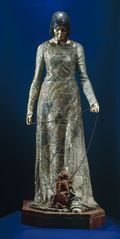 twentieth century. We were all particularly taken by the slightly repulsive, but a bit wondrous, portrait of a women with a monkey (on the right).
twentieth century. We were all particularly taken by the slightly repulsive, but a bit wondrous, portrait of a women with a monkey (on the right).
I am afraid (or pleased) to say that pretty much at that point we felt we were all too knackered for more art and went back to the Gare du Nord, had a slightly chilly drink outside, doing the Paris café thing.. then to the train home. (Luckily I do it quite often, so my card let us all go into the Euro-lounge and read the magazines, as you can see!). Wish them good luck for their exams please. And tell them to be bloody, bold and resolute, not "good girls". Sorry about the gendering, but there you go.
May 4, 2014
Masterchef, moi?
I am going to confess, before you discover, that I am on Masterchef next week. Now this is an innocent and popular piece of BBC entertainment (for non UK residents, it's a "cook-off" that runs over many weeks on the television between a number of amateur chefs); but it is not part of my regular viewing.
I am going on the programme not to cook, you will be pleased to know, but to be part of a group of historians who are cooked for by some of the leading contestants.
And before you say, "why on earth...?", let me answer.
OK, the first answer must be curiosity. It's hard not to wonder how this kind of reality-competition TV show is made, and what it looks like on the ground.
But there are two other reasons, one more and one less honourable.
The honourable one goes back to Jamie's Dream School. I went on that because it seemed a particularly good way of getting a bit of Latin into the living rooms of some of the vast majority of the British popuation who do NOT plan their Thursday evenings around watching some new documentary about the Romans. It was a good way (so I hoped) of sneaking some Latin into prime-time popular telly.
It's a bit the same with Masterchef. This was to be a cookery show with a historical edge (what was the diet of the past? etc), and again it seemed to me to be a nice (and light-hearted) way of squeezing some history onto the living room screen.
The less honourable reason was this. The programme was to be filmed in a historical setting, which was -- as you will see, if you watch -- the lovely Hever Castle in Kent, where I had never been and where we had a great time. But when the programme was first mooted, a different location was suggested -- one which I had been busting to see for ages, and it tipped the balance for me saying yes. By the time, the final details came, however, that location had changed. We were now filming at Hever Castle.
It would have been far too diva-like (albeit in a slightly geeky way) to say "oh my god, if we're not going to X, I'm not interested", and actually Hever Castle was smashing (and a great fave Lucy Worsley, one of my historical colleagues on the show, was brilliant at explicating it to us all) -- but the original academic drive had been slightly derailed.
So there you go; I hope you enjoy if you turn on (it's 8.00 BBC 1 on Thursday), and more to the point I hope I don't want to fall through the floor.
And in case you're wondering, no I DIDN'T do it for the money. 'Nuff said.
April 30, 2014
The Romans in India
I am jumping ahead of myself a bit with this book on the history of Rome. That is to say, I am now just about to write the first page (I am determined that tomorrow will not end until I have actually got a file on my computer entitled "SPQRChap1" and some words in it). But I am also giving myself sme time looking at material for much later chapters.
So, when it comes to thinking about Rome's global reach, I have in mind discussing Roman trade with India. And I am wanting to get some good material to illustrate that. Now, I've read (and thought) quite a bit about the Roman idea of India and the East (and, of course, from another point of view, I know all those clichés about how nineteenth-century British historians imposed their own assumptions about British rule in India on their understanding of the nature of Roman imperialism -- often a bit too seductively simple an imposition, if you ask me).
But what I am now interested in (and what I've never really got to grips with before) are the actual traces of Roman on the ground in India. I've done the basic reading, but what next?
There are, indeed, rather more of those traces than I had realised (I must confess). That coin at the top of this post is Roman second century AD, found in India, with an Indian countermark on it (between the standing figures of Jupiter and the emperor). There is the famous site of Arikamedu, which for part of its history clearly functioned as a Roman-Indian trading port. It was first excavated by Mortimer Wheeler, and has recently been re-explored by Vimala Begley. And in 2011 there was a brief exhibition in Chennai of some of the Roman coins and other artefacts from their museum collection (apparently Chennai museum has more Roman coins -- over 4000 of them -- than any other museum outside Europe).
So I'm now planning a visit, but I'm not quite sure where to go -- where I can see some of the Roman stuff and sites on public display (I'm not yet on top of the subject enough to ask for special academic access -- I'm being touristic to be honest). Obviously Chennai is a must, plus Arikamedu. But where else?
This blog is a bit of a cry for help. Has anybody seen any good Roman displays when they have been in South India? Do let me know.
Mary Beard's Blog
- Mary Beard's profile
- 4110 followers



